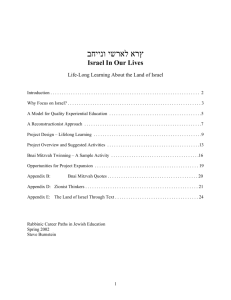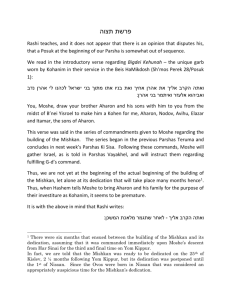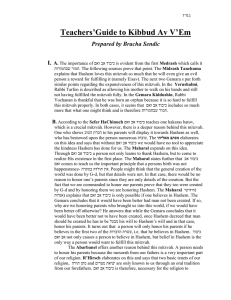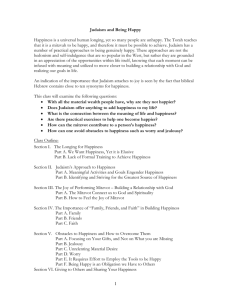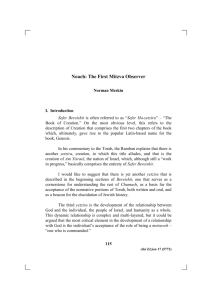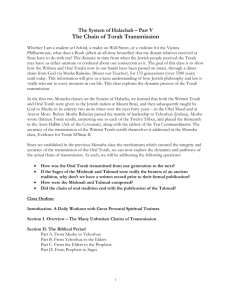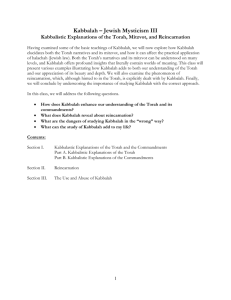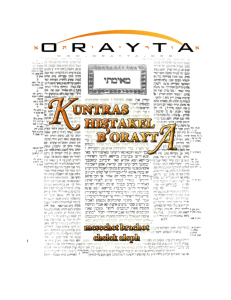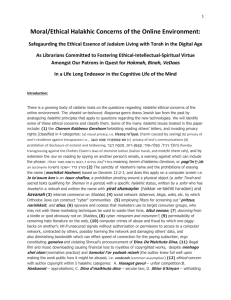introduction - Morasha Syllabus
advertisement
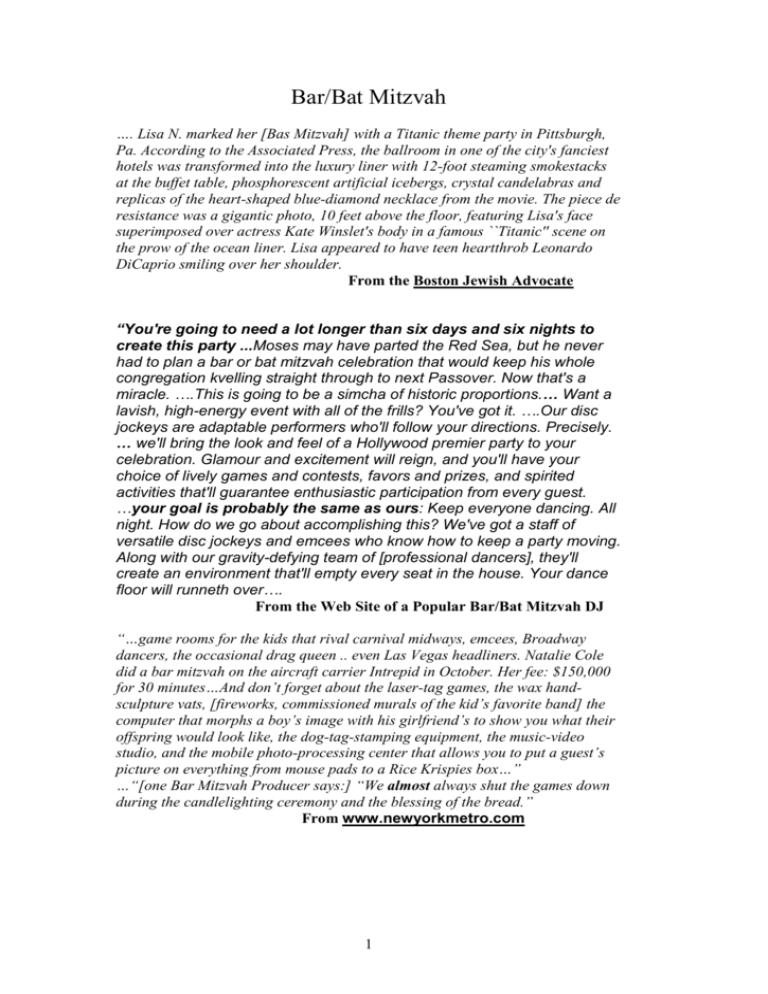
Bar/Bat Mitzvah …. Lisa N. marked her [Bas Mitzvah] with a Titanic theme party in Pittsburgh, Pa. According to the Associated Press, the ballroom in one of the city's fanciest hotels was transformed into the luxury liner with 12-foot steaming smokestacks at the buffet table, phosphorescent artificial icebergs, crystal candelabras and replicas of the heart-shaped blue-diamond necklace from the movie. The piece de resistance was a gigantic photo, 10 feet above the floor, featuring Lisa's face superimposed over actress Kate Winslet's body in a famous ``Titanic'' scene on the prow of the ocean liner. Lisa appeared to have teen heartthrob Leonardo DiCaprio smiling over her shoulder. From the Boston Jewish Advocate “You're going to need a lot longer than six days and six nights to create this party ...Moses may have parted the Red Sea, but he never had to plan a bar or bat mitzvah celebration that would keep his whole congregation kvelling straight through to next Passover. Now that's a miracle. ….This is going to be a simcha of historic proportions.… Want a lavish, high-energy event with all of the frills? You've got it. ….Our disc jockeys are adaptable performers who'll follow your directions. Precisely. … we'll bring the look and feel of a Hollywood premier party to your celebration. Glamour and excitement will reign, and you'll have your choice of lively games and contests, favors and prizes, and spirited activities that'll guarantee enthusiastic participation from every guest. …your goal is probably the same as ours: Keep everyone dancing. All night. How do we go about accomplishing this? We've got a staff of versatile disc jockeys and emcees who know how to keep a party moving. Along with our gravity-defying team of [professional dancers], they'll create an environment that'll empty every seat in the house. Your dance floor will runneth over…. From the Web Site of a Popular Bar/Bat Mitzvah DJ “…game rooms for the kids that rival carnival midways, emcees, Broadway dancers, the occasional drag queen .. even Las Vegas headliners. Natalie Cole did a bar mitzvah on the aircraft carrier Intrepid in October. Her fee: $150,000 for 30 minutes…And don’t forget about the laser-tag games, the wax handsculpture vats, [fireworks, commissioned murals of the kid’s favorite band] the computer that morphs a boy’s image with his girlfriend’s to show you what their offspring would look like, the dog-tag-stamping equipment, the music-video studio, and the mobile photo-processing center that allows you to put a guest’s picture on everything from mouse pads to a Rice Krispies box…” …“[one Bar Mitzvah Producer says:] “We almost always shut the games down during the candlelighting ceremony and the blessing of the bread.” From www.newyorkmetro.com 1 Points to Ponder: What are a Bar Mitzvah and a Bat Mitzvah? When do they happen? Why then? How are they celebrated? What stands out about the Bar and Bat Mitzvahs that you’ve attended? Are they different from the coming-of-age ceremonies of other cultures? OUTLINE INTRODUCTION SECTION 1: Greater is One Who is Commanded SECTION 2: Bnei Mitzvah, Puberty & Community CONCLUSION INTRODUCTION Most Jews today celebrate1 the occurrence of a child becoming Bar/Bat Mitzvah. What exactly are we celebrating? Let us begin learning. 2 Section 1: Greater is One Who is Commanded We begin with a quote from the Talmud: Rav Chanina said: 'Greater is one who is commanded and does than one who is not commanded and does'. Rav Yosef [who was blind] said: 'Originally, I would have said that if one were to tell me the halacha is decided like Rav Yehuda (who rules that a blind person is exempt from performing mitzvot) I would have made a party for the sages, for it would mean that I am not obligated yet I perform the mitzvot Now that I have heard the statement of Rav Chanina that it is greater to perform the mitzvot when one is commanded, if one were to tell me that the halacha is decided not like Rav Yehuda I would make a party'."3 אר"ח גדול מצווה ועושה ממי שאינו מצווה ועושה אמר רב יוסף מריש ה"א מאן דהוה אמר לי הלכה כר"י דאמר סומא פטור מן המצות עבידנא יומא טבא לרבנן דהא לא מיפקידנא והא עבידנא השתא דשמעיתא להא דא"ר חנינא גדול מצווה ועושה יותר ממי שאינו מצווה ועושה אדרבה מאן דאמר לי דאין הלכה כרבי יהודה עבידנא יומא טבא לרבנן Tractate Kiddushin (31a) Knowing that he was commanded to keep the mitzvot, Rav Yosef wanted to make a party is because "greater is he who is commanded and does than he who is not commanded and does." Does this make sense to us? How does this relate to our experiences in life? How do you understand this Talmudic statement? 2 Why is one who is commanded and does considered greater than a ‘volunteer’?4 There are two5 approaches in the Early Authorities to address this: Tosfot and the Tosfot HaRosh6: Greater is one who is commanded and does – – גדול המצווה ועושה The reason that someone who is commanded is greater is because he is troubled and concerned by the possibly of not performing the mitzvot properly; as opposed to someone who is not commanded who has “bread in his basket”, if he wants he can set the mitzvah aside.7 נראה דהיינו טעמא דמי שמצווה ועושה עדיף לפי שדואג ומצטער יותר פן יעבור ממי שאין מצווה שיש לו פת בסלו שאם :ירצה יניח Tosfos ad loc אין הקב"ה צריך כלום לכל המצוות אלא שאומר ונעשה רצונו G-d does not “need” our mitzvot, rather that He commands and we fulfill His will. Therefore one who is commanded is fulfilling the will of Hashem, as opposed to one who does mitzvot voluntarily cannot be said to fulfill the will of Hashem, for [Gd] did not command him anything. הילכך המצווה ועושה הוא עושה רצון קונו אבל מי שאינו מצווה ועושה לא שייך לומר ביה עושה רצון קונו שהרי לא צוה לו כלום Tosfot HaRosh8 ad loc To fully understand this second view, we must introduce an insight as to what a mitzvah is: מצוה הוא לשון צוותא היינו כשאדם עושה מצוה צריך לעשותה בצוותא ודביקות להקב"ה זהו עיקר המצוה Mitzvah shares the same root as “tzavsa” –“bonding”. When a person performs a mitzvah he must do it to bond and cleave with God, as this is the primary purpose of a mitzvah.9 Degel Machane Ephraim How do you understand these two explanations? How does this idea – that he one who is commanded is greater – relate to the following Gemara ? תנו רבנן שתי שנים ומחצה נחלקו בית שמאי ובית הלל The Rabbis taught: For two and a half years the students of Shammai and the students of Hillel had a disagreement. 3 These (the students of Shammai) said “It would be better for man to have not been created” and these (the students of Hillel) said “It is better for man that he was created. הללו אומרים נוח לו לאדם שלא נברא יותר משנברא והללו אומרים נוח לו לאדם שנברא יותר משלא נברא They tabulated the count and decided “it is better for man to have not been created than to have been created”. נמנו וגמרו נוח לו לאדם שלא נברא יותר . משנברא Tractate Eiruvin 13b It is better for man to not have been created?! That seems very pessimistic! Why? יותר טוב לו שלא נברא כי הוא קרוב להפסד … ורחוק לשכר It would be better not to have been created because he is likely to fail …and is unlikely to succeed. Maharsha10 How do the Gemaras in Eruvin (Better not to have been created) and Kiddushin (greater to be commanded and do) relate to each other? Let us consider them carefully: if it ‘would have been better to not have been created’, why do we celebrate becoming obligated in mitzvot? Wouldn’t it be better to remain in a situation that we are not obligated?11 How do you understand these sources? II SECTION 2: Bnei Mitzvah, Puberty & Community Under the age of Bar/Bat Mitzvah, a child is not counted as a ‘full member’ of the Jewish people, rather still considered a ‘child,’ who cannot perform religious acts for others (as an ‘agent’), and whose mitzvot do not fully count. A child’s Jewish acts are really considered training for when they become adults. Upon coming of age, the child becomes a full-fledged member for all of purposes. On this level, there is a celebration for the community that another has joined their ranks. The age of Bar/Bat Mitzvah is 13 for a boy and 12 for a girl. This coincides with the onset of puberty, which occurs earlier to girls than to boys. In a letter to a teenaged boy, Rabbi Shlomo Wolbe writes כי מן הרגע שתאי,על האדם לדעת אינו-הזרע בגופו מתעוררים להתרבות .עוד יציר החי רק חיי עצמו Every person needs to know that from the moment that his reproductive organs begin to develop he is no longer living in a personal, private state of existence. 4 These processes in his body are enabling him to be a parent to children, a progenitor of a new generation. The life that he received from three partners- his father, mother and Creator- he is now commanded to pass on to the next generation together with his two partners: the spouse that Hashem will send him and the Divine spirit that will reside with them. תהליכים אלו בגופו מכשירים אותו את. מוליד דור חדש,להיות אב לבנים ,החיים שהוא קיבל משלושת השותפים אביו ואמו ובוראו – הנו מצווה למסור עם: שוב עם שני שותפים- לדור הבא האשה אשר יוכיח ה' להיות לו לעזר .ועם השכינה שתשרה ביניהם Preparation for the great responsibility of parenthood must begin from the initial moments of sexual maturation. The young person must even then understand “you will be a parent to children”. ההתכוננות לתפקיד הגדול הזה צריכה להתחיל ברגע,""להיות אב אז...שתאי הזרע מתחילים בפעולתם הנך נועד להיות אב:על הצעיר לדעת !לבנים Alei Shur12 The age of becoming a full member of the Jewish people is the age when one becomes able to be a link in the chain of the Jewish people. The two go hand in hand. How do you understand this? CONCLUSION “Bar” is Aramaic for “son of”; “Bat” is Hebrew for “daughter of”. What does Bar/Bat Mitzvah really mean? What change has occurred?13 It should be noted that one becomes a Bar/Bat mitzvah upon reaching the proper age (13 for a boy, 12 for a girl). This is true whether one commemorates the event or not. 1 2 As with all things Jewish, the proper place to start our search is the Torah and the Talmud [The Talmud is not just a law book. It is referred to as the ‘Sea of Talmud’. It is a repository of all Jewish knowledge up to its time, spanning over 4,000 pages, including Biblical interpretation, laws of mitzvoth, communal customs, ethical teachings and much more.] While there is much discussion of new responsibilities, etc, surprisingly, we do not find any mention of the Bar/Bat Mitzvah celebration in the Torah or the Talmud! Why? It seems that the essential idea of a Bar/Bat Mitzvah has broader applications in Torah thought, so it is not dealt with in a particular way. 3 There was a disagreement as to whether blind people are obligated in the performance of mitzvoth (in mitzvos Asei). Upon learning that the law is decided 5 that a blind man is obligated in mitzvoth (ask a Rabbi for the ‘halacha lemaaseh) Rav Yosef – who was blind - said that he would make a celebration. This is the idea of a Bar/Bat Mitzvah celebration. At the time that the child becomes obligated in the mitzvoth of the Torah we celebrate. 4 Often in life, the volunteer shows more dedication than the hired hand. So why should it be that one who performs mitzvoth when obligated is considered greater than one who does is on a volunteer basis? Isn’t choosing to do something a higher level? Who do we show more appreciation to: the delivery man who simply does his job or the friend who goes out of his or her way to do us a favor and drop something off for us? 5 There are others, we are focusing on these for now Tosfot are a compilation of Talmudic commentaries edited in the 1200-1400’s, mainly in France. Tosfot HaRosh are the commentaries of the Tosafists edited by R’ Asher ben Yechiel, one of the foremost medieval Talmudic commentators and Halacha rulers. 6 7 Someone that is doing something because it is obligatory possesses an advantage that the volunteer lacks: the stress of consequences of not doing it right. A volunteer knows that whatever he does is a bonus, it is all a plus, and so there is no element of pressure involved. He may do it, he may not do it, he may take it seriously, he may not. Someone who is commanded takes it more seriously. It is his ‘job’. He ‘works harder’ at it. There is a rule that reward is given relative to the difficulty of what one did, ) לפום צערא אגראAvot 5:22), therefore one who is obligated will get greater reward. Note that more than one ‘explanation’ can be true: these two views can complement each other. 8 Similarly: רבינו הנדול ז"ל פי' שהמצות אינן להנאת האל יתברך המצוה אלא לזכותינו Our Great Teacher, [Maimonides] of blessed memory, explained, that the commandments are not to bring pleasure to G-d, may He be blessed, ‘the Commander’, rather for our benefit. ומי שהוא מצווה קיים גזירת המלך ולפיכך שכרו הרבה יותר מזה שלא קיים מצות המלך And one who is commanded fulfills the decree of the King and therefore his reward is much greater than one who does not fulfill the commandment of the King. Ritva 9 This quote appears in the topics section under the heading "mitzvah". The word mitzvah shares a root with the word "tzavsa", to accompany. The proper translation of mitzvah is not really "commandment"; it is more "connector". True connection can only be formed where both sides are active. One who is 6 commanded in the Mitzvoth and then does them has a full relationship with Hashem. It is more than us doing particular actions that make Him "happy", it doing those things as a fulfillment of His will. This is an added dimension to which one who is not commanded does not have access. Note that many commentators, ie Maimonides, would likely disagree as to the main purpose of a Commandment. 10 Makkot 23b ‘Taryag’ 11 One approach is to differentiate between individuals and the group. Perhaps the Talmud in Eruvin is making a statistical statement that many people are likely to fail their moral and spiritual mission in life, and for them it would have been better not to be born. On the other hand, Rav Yosef’s statement and our celebration of Bar and Bat Mitzvah show our confidence that this individual will rise to the challenge. By saying that becoming obligated in mitzvot is a cause for celebration for our child, we are in essence saying “you can become great”. In a similar vein, Tosfot (Eiruvin ibid, s.v. Noach) comment: הכא איירי בסתם בני אדם אבל צדיק אשריו ואשרי דורו This is discussing the average person, but regarding a righteous person we say “happy is he (that he was created) and happy is his generation”. For another approach, see Michtav Me’Eliyahu Volume 2 page 117. At a deep level, then, we are essentially saying that the Bar/Bat Mitzvah is a celebration for the individual, for the child that has entered into this higher relationship with G-d. 12 volume 1 page 40 13 Until now the parents have formed the attitudes and behavior patterns of the child. The name Bar/Bat Mitzvah is an expression of the hope that from now on the child will have an additional source of authority and outlook: The attitudes and behavior patterns of the child will be formed by the Mitzvot, by that which forms the bond between us and G-d13. The Zohar (Shemot 98a) takes it a step further. One who has merited reaching his אקרי בן,ההוא דזכי לתליסר שנין ולהלאה thirteenth year is called a son of the וכל מאן דאיהו מבן עשרין,לכנסת ישראל Jewish people, one who is twenty years לקודשא אקרי בן,שנין ולעילא וזכי בהו and above and merits is called a son to ודאי (דברים יד א) בנים אתם,בריך הוא Hashem, as it says (Deut. 14:1) “You are .ליהו"ה אלהיכ"ם children of Hashem your God”. When King David reached his thirteenth year, and merited on that day that he entered his fourteenth year, he said (Psalms 2:7) “Hashem said to me ‘you are my son’” וזכה בההוא יומא,כד מטא דוד לתליסר שנין ) כדין כתיב (תהלים ב ז,דעאל לארביסר יהו"ה אמר אלי בני אתה 7
